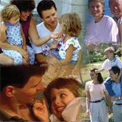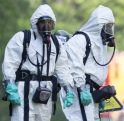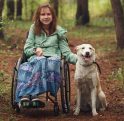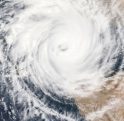Health Departments Close for Winter Weather
Posted February 11, 2014 by NCHD Admin
Winter weather is expected in our area over the next few days. The North Central Health District and all 13 county health departments located in the district will close today at 3:00 p.m. and will reopen Friday, February 14 at 8:00 a.m. Stay warm and safe!
When winter temperatures drop significantly below normal, staying warm and safe can become a challenge. Exposure to cold temperatures, whether indoors or outside, can cause other serious or life-threatening health problems.  Infants and the elderly are particularly at risk, but anyone can be affected. Extremely cold temperatures often accompany a winter storm, so you may have to cope with power failures and icy roads. Although staying indoors as much as possible can help reduce the risk of car crashes and falls on the ice, you may also face indoor hazards. Many homes will be too cold—either due to a power failure or because the heating system isn’t adequate for the weather. When people must use space heaters and fireplaces to stay warm, the risk of household fires increases, as well as the risk of carbon monoxide poisoning.
Infants and the elderly are particularly at risk, but anyone can be affected. Extremely cold temperatures often accompany a winter storm, so you may have to cope with power failures and icy roads. Although staying indoors as much as possible can help reduce the risk of car crashes and falls on the ice, you may also face indoor hazards. Many homes will be too cold—either due to a power failure or because the heating system isn’t adequate for the weather. When people must use space heaters and fireplaces to stay warm, the risk of household fires increases, as well as the risk of carbon monoxide poisoning.
To keep yourself and your family safe, you should know how to prevent cold-related health problems and what to do if a cold-weather health emergency arises. The emergency procedures outlined in the links below are not a substitute for training in first aid. However, these procedures will help you to know when to seek medical care and what to do until help becomes available.
What Is Extreme Cold? What constitutes extreme cold and its effects can vary across different areas of the country. In regions relatively unaccustomed to winter weather, near freezing temperatures are considered “extreme cold.” Whenever temperatures drop decidedly below normal and as wind speed increases, heat can leave your body more rapidly. These weather-related conditions may lead to serious health problems. Extreme cold is a dangerous situation that can bring on health emergencies in susceptible people, such as those without shelter or who are stranded, or who live in a home that is poorly insulated or without heat.
Posted from the Centers for Disease Control and Prevention:
http://www.cdc.gov/Features/WinterWeather/index.html
http://www.bt.cdc.gov/disasters/winter/pdf/extreme-cold-guide.pdf
Additional tips:
- Space heaters need space. Make sure they are not close to any object, especially flammable ones.
- Space heaters also need cleaning often. Make sure you follow your space heater’s cleaning recommendations.
- If weather gets extreme, many communities offer “warming stations” for people who might need a warm place to go until the extreme weather passes. Listen to local media to know if a warming station is open in your area.


 Contact Us
Contact Us Locations
Locations Job Openings at North Central Health District
Job Openings at North Central Health District Internships
Internships Board of Health
Board of Health Cost and Insurance
Cost and Insurance Privacy Policy
Privacy Policy Teens & Adults
Teens & Adults For Children
For Children Other Programs
Other Programs County Environmental Health Offices
County Environmental Health Offices Chemical Hazards
Chemical Hazards Tourist Accommodations
Tourist Accommodations Food Service
Food Service Rabies Control
Rabies Control Lead Poisoning Prevention
Lead Poisoning Prevention Body Art
Body Art Land Use
Land Use Swimming Pool Program
Swimming Pool Program Water Testing for Private Wells
Water Testing for Private Wells Environmental Health Complaints
Environmental Health Complaints Georgia Food Recall Alerts
Georgia Food Recall Alerts Personal & Family Preparedness
Personal & Family Preparedness Emergency Preparedness for Functional & Access Needs
Emergency Preparedness for Functional & Access Needs Severe Weather Preparedness
Severe Weather Preparedness Emergency Preparedness Training
Emergency Preparedness Training Medical Reserve Corps
Medical Reserve Corps Regional Healthcare Coalitions
Regional Healthcare Coalitions Strategic National Stockpile/Medical Countermeasures
Strategic National Stockpile/Medical Countermeasures